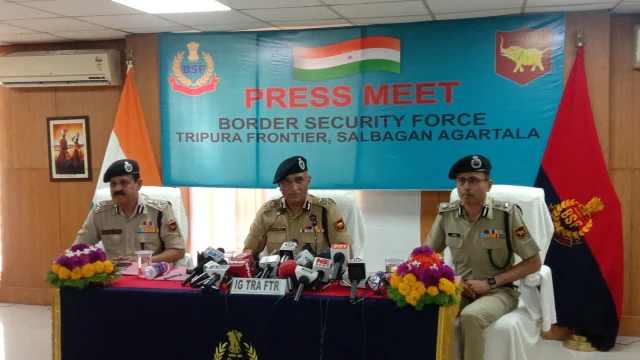The Border Security Force (BSF) has taken significant strides in fortifying Tripura’s borders by covering six out of the eleven unfenced patches with single-row fencing. This proactive measure aims to bolster security and curb illicit activities along the state’s vulnerable borders, marking a pivotal step towards safeguarding territorial integrity and ensuring the safety of border residents. With a target to complete the fencing project by 2025, the BSF’s efforts signify a commitment to enhancing border security infrastructure and addressing long-standing challenges posed by porous borders.
Tripura shares its borders with Bangladesh on three sides, making it susceptible to various transnational threats, including smuggling, illegal migration, and cross-border infiltration. The unfenced patches along the border have long been identified as vulnerable points that facilitate nefarious activities and pose security challenges for both India and Bangladesh. In response to these concerns, the BSF has embarked on a comprehensive fencing initiative to secure these vulnerable stretches and mitigate security risks.
The decision to prioritize single-row fencing as part of the border fortification strategy is driven by several factors, including operational feasibility, cost-effectiveness, and the need for expeditious implementation. Single-row fencing, consisting of barbed wire or concertina wire barriers, serves as a deterrent to unauthorized border crossings while allowing for better surveillance and patrolling by security personnel. By covering six out of the eleven unfenced patches with single-row fencing, the BSF has significantly enhanced the security posture along Tripura’s borders and reduced vulnerabilities to external threats.
Moreover, the progress made by the BSF in fencing unfenced border patches underscores the government’s commitment to strengthening border infrastructure and ensuring the safety and security of border residents. The completion of the fencing project by 2025 is expected to further enhance border security capabilities and create a robust deterrent against illicit activities, thereby safeguarding India’s territorial integrity and sovereignty.
The fencing initiative is also aligned with broader efforts to promote regional security and cooperation between India and Bangladesh. By securing the border and curbing illicit activities, the fencing project contributes to maintaining peace and stability in the region, fostering mutual trust and confidence between the two neighboring countries. Moreover, it underscores the importance of bilateral cooperation in addressing common security challenges and promoting shared interests.
However, the fencing project is not without its challenges and complexities. The unfenced border patches in Tripura traverse diverse terrain, including dense forests, riverine areas, and hilly terrain, presenting logistical challenges for construction and maintenance. Moreover, the presence of local communities residing in close proximity to the border adds another layer of complexity, necessitating effective coordination and consultation with stakeholders to ensure the smooth implementation of the project.
Furthermore, concerns have been raised regarding the potential impact of fencing on cross-border interactions and livelihoods, particularly for communities with traditional ties and economic activities spanning both sides of the border. It is imperative for authorities to address these concerns sensitively and ensure that the fencing project does not unduly disrupt the lives and livelihoods of border residents.
In a nutshell, the progress made by the BSF in covering six out of the eleven unfenced border patches in Tripura with single-row fencing marks a significant milestone in enhancing border security infrastructure and addressing long-standing security challenges. The fencing initiative reflects the government’s commitment to securing India’s borders and safeguarding the interests of border residents. As the BSF works towards completing the fencing project by 2025, it is essential to prioritize stakeholder engagement, address logistical challenges, and ensure that the project contributes to regional security and cooperation between India and Bangladesh.



